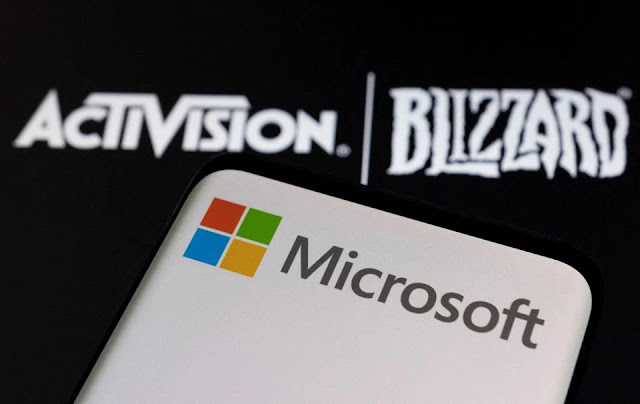 |
|
| Microsoft logo is seen on a smartphone placed on displayed Activision Blizzard logo in this illustration taken January 18, 2022. REUTERS/Dado Ruvic/Illustration |
Approved in the United States and other major jurisdictions, including the European Union and China. It comes at a time when President Joe Biden's administration is taking a closer look at large mergers, blaming some of them for raising prices to consumers that are fueling inflation.
Activision's shares ended trading at $82.15 on Wednesday, well below the $95 per share deal price, reflecting concerns that regulators may shoot down a combination that would create the third biggest gaming company, after Tencent and Sony Group Corp (6758.T).
This infers a 57% chance of the deal closing, based on Activision's closing share price of $65.39 before the deal was announced.
The wide spread gives investors willing to bet on whether the deal will be completed the opportunity to score double-digit returns. At a time when so-called merger arbitrage strategies have trailed the broader stock market's returns, it is an attractive but also risky proposition.
Last year, merger arbitrage funds returned nearly 10% according to Hedge Fund Research data, beating returns posted in 2020, 2019 and 2018, but trailing the broader S&P 500 stock market's 27% gain in 2021.
For some investors, Aon's (AON.N) scuttled $30 billion acquisition of Willis Towers Watson (WTY.F) as the U.S. Justice Department sued to block the deal hurt returns.
Now they are looking to come back, hoping that this deal will also force competitors into making deals of their own.
"The positive outlook for event-driven and merger-arbitrage oriented firms in 2022 has been accelerated with the Microsoft-Activision deal," said Hedge Fund Research Inc President Ken Heinz.
Microsoft and Activision gave themselves until June 2023 to complete the transaction, giving hedge funds months to handicap how regulators will react to Microsoft bundling its Xbox platform with Activision's popular games, such as World of Warcraft and Diablo.
Investors may get hints on the Biden administration's stance soon as the Federal Trade Commission is expected to weigh in on defense contractor Lockheed Martin's (LMT.N) planned $4.4 billion acquisition of Aerojet Rocketdyne (AJRD.N) and the Justice Department will decide on healthcare insurer UnitedHealth's (UNH.N)$13 billion bid for healthcare analytics and technology vendor Change Healthcare (CHNG.O).
Coverage finds such as Millennium, Tiesemann consultant and pentwater capital spend a piece of their fusion bets, and many have occupied Microsoft and Activision for some time.Mutual funds The Merger Fund run by Westchester Capital Management and The Arbitrage Funds run by Water Island Capital offer similar strategies.
source https://techncruncher.blogspot.com/2022/01/microsoft-activision-deal-gives-merger.html
Comments
Post a Comment